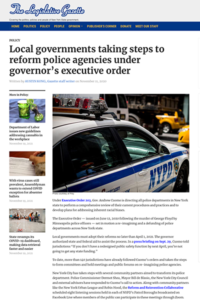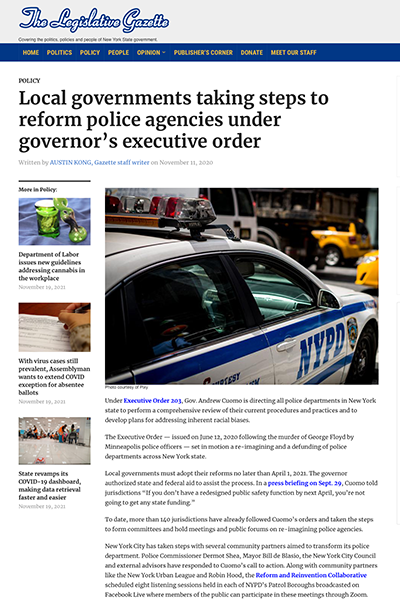Local Governments Taking Steps to Reform Police Agencies Under Governor's Executive Order
The Legislative Gazette | People | Politics | Austin Kong
Under Executive Order 203, Gov. Andrew Cuomo is directing all police departments in New York State to perform a comprehensive review of their current procedures and practices and to develop plans for addressing inherent racial biases.
The Executive Order, issued on June 12, 2020 following the murder of George Floyd by Minneapolis police officers, set in motion a re-imagining and a defunding of police departments across New York state.
Local governments must adopt their reforms no later than April 1, 2021. The governor authorized state and federal aid to assist the process. In a State Press Briefing on Sept. 29, Cuomo told jurisdictions “If you don’t have a redesigned public safety function by next April, you’re not going to get any state funding.” 146 jurisdictions have already followed Cuomo’s orders and taken the steps to form committees.
As of late, New York City has taken steps with several community partners aimed to transform its police department. Police Commissioner Dermot Shea, Mayor Bill de Blasio, the New York City Council and external advisors have responded to Cuomo’s call to action. Along with community partners like the New York Urban League and Robin Hood, the Reform and Reinvention Collaborative scheduled eight listening sessions held in each of NYPD’s Patrol Boroughs broadcasted on Facebook Live where members of the public can participate in these meetings through Zoom.
The executive order dictates that all municipalities must develop a comprehensive review of their policing strategies and practices including addressing systemic racial bias, implicit bias awareness training, and a reduction of any racial disparities in policing. Some of these directives plan to rekindle the relationship with their communities, especially those affected disproportionately by unfair policing.
The New York City Council, in an effort to help reform its policing, announced an agreement on the Fiscal Year 2021 budget cutting $1 billion from the New York Police Department’s spending capacity, including $837 million in cuts and transfers that would instead go to programs like education, public housing and mental health services.
In response to the executive order, Albany Mayor Kathy Sheehan and Police Chief Eric Hawkins scheduled a series of Policing Reform and Reinvention Collaborative meetings to discuss ways they could change their police department and, hopefully, tackle some of the needs of communities that have been disproportionately affected by structural racism.
Sheehan, Hawkins and community leaders held a series of virtual public forums in August and September to address adopting a police reform plan by April 1, 2021. Some of the plans include engaging in a robust conversation about policing in Albany and laying groundwork for improvement through collaborative working groups. These groups will consist of members of the community, city staff and a representative from the Albany Police Department to create a group report that will be presented to the Albany Common Council for review by January 31st, 2021.
The working group will then produce recommendations and will release them as a final draft report for the public to comment. Those comments will then be reviewed by the Collaborative, and then a final report will be presented to the Albany Common Council.
Other local municipalities that are in compliance with Executive Order 203 include Nassau County, Croton-on-Hudson, Wayne County, City of Poughkeepsie, Village of Cobleskill. Other counties across New York State have already started to review their own police force and practices.
Talks of police reform have spread to other police departments in other states where they too began reviewing their own practices.
John Jay College of Criminal Justice has been hosting one of the leading online forums that plans to reimagine policing for all racial communities and fix the overarching problem of systemic racism in the criminal justice system.
Participants in these online forums include Philadelphia Police Chief Danielle Outlaw who’s agreed that the idea of policing and public safety needs to be redefined. “Whenever there’s a police presence, it automatically criminalizes whatever that matter is,” she said.
Minneapolis Police Chief Medaria Arrandondo has advocated for reallocating some of the budget toward independent organizations like LIFE Camp, dedicated to reducing gun violence and breaking the cycle of violence in New York City’s communities.


